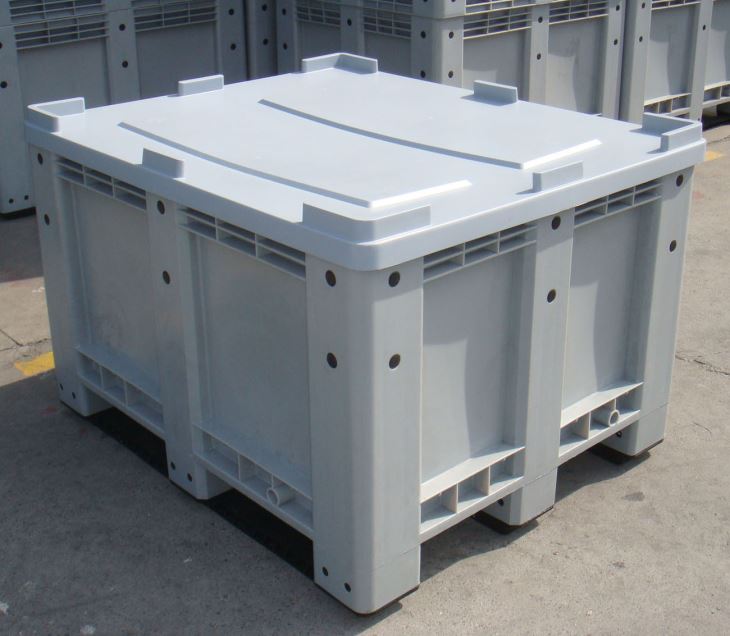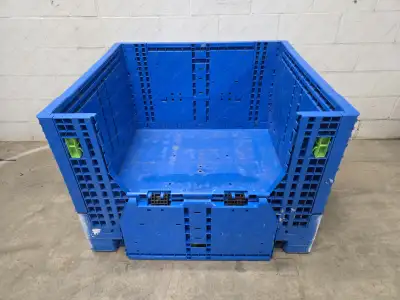Top reasons to choose used bulk containers for sustainable business operations
Wiki Article
Why Bulk Containers Are Important for Cost-efficient and lasting Transport
Bulk containers play a vital function in modern logistics. They promote the effective activity of big quantities of products, consequently optimizing transportation procedures. This approach not just decreases expenses yet also reduces ecological impact via reduced emissions and waste generation. As sectors seek even more lasting practices, the adoption of bulk containers is coming to be progressively significant. What effects does this shift hold for future logistics and supply chain management?
The Advantages of Making Use Of Bulk Containers in Logistics
Mass containers change logistics by enhancing efficiency and sustainability. These containers enable the transport of huge amounts of items in a solitary trip, markedly lowering the number of trips required. This not just simplifies operations yet likewise minimizes labor costs connected with handling, loading, and dumping. In enhancement, mass containers are created to enhance area use within transport cars, guaranteeing that more products can be shipped simultaneously.The standardization of mass containers likewise simplifies the logistics process. With consistent measurements, they can be conveniently piled and saved, resulting in enhanced storage facility management. Bulk containers usually feature sturdy products that shield materials from damage throughout transit, therefore decreasing product loss and enhancing general reliability. Consequently, businesses can experience boosted supply chain efficiency, inevitably resulting in enhanced success and customer fulfillment. This combination of aspects makes mass containers an important possession in modern logistics.
Ecological Impact: Lowering Waste and Carbon Impact
As markets increasingly prioritize sustainability, the fostering of bulk containers has actually become a crucial technique for reducing waste and decreasing carbon footprints. These containers lessen making use of product packaging products, such as boxes and plastic, therefore significantly decreasing general waste generation. By settling shipments, mass containers boost transportation performance, enabling for more products to be transferred per journey. This decrease in trips straight associates with reduced greenhouse gas emissions, contributing to a smaller sized carbon impact.Additionally, mass containers can typically be recycled or reused, even more alleviating environmental impact. The toughness of these containers guarantees they can endure several transportation cycles, lowering the need for single-use alternatives. used collapsible containers. By improving logistics and promoting effective source use, mass containers not only sustain lasting practices yet likewise motivate markets to line up with international ecological objectives. Eventually, their implementation reflects a commitment to ecological stewardship and responsible source monitoring
Price Financial Savings: Exactly How Mass Containers Lower Transportation Expenditures
While lots of companies look for means to improve their lower line, using mass containers provides a significant opportunity for decreasing transportation costs. Bulk containers make the most of the volume of products delivered, allowing companies to deliver larger quantities at the same time. This effectiveness minimizes the number of trips called for, straight reducing gas prices and lessening labor expenses related to loading and dumping.Furthermore, mass containers frequently feature structured designs that maximize area use within transport automobiles. This implies fewer voids, leading to more reliable use readily available capability. The longevity of bulk containers can reduce the threat of product damages during transit, lowering losses and ensuring that even more items arrive undamaged.
Enhancing Supply Chain Performance With Bulk Storage Solutions
Mass storage space solutions play a necessary duty in enhancing supply chain effectiveness by maximizing supply management. By consolidating products right into less, bigger containers, businesses can considerably decrease managing prices connected with regular transfers and processing. This streamlined method permits much better monitoring and administration of supply, ultimately causing enhanced functional performance.Streamlined Stock Administration
Efficient stock administration is necessary for enhancing supply chain procedures, specifically when companies embrace bulk storage space options. These services allow services to maintain higher stock levels while decreasing the frequency of replenishment. By settling products right into bulk containers, business can improve their inventory processes, reducing the intricacy related to tracking numerous smaller packages. This technique promotes precise supply matters and boosts projecting accuracy, enabling more educated decision-making. In addition, mass storage space options streamline warehouse organization, making it easier to situate and gain access to products when required. As an outcome, organizations can attain a much more efficient supply turn over rate, eventually boosting overall supply chain efficiency and minimizing the probability of stockouts or overstock scenarios.
Minimized Handling Costs
The execution of bulk storage solutions not only enhances stock administration however additionally substantially minimizes managing expenses throughout the supply chain. By settling materials into bulk containers, business reduce the demand for constant handling and transfer between different storage space and transportation units. This method reduces labor costs associated with loading, unloading, and relocating smaller packages. Furthermore, mass storage reduces the frequency of shipments, causing lower transportation expenses and decreased gas usage. Therefore, organizations can enhance their logistics operations, permitting a much more efficient allocation of resources. Inevitably, decreased managing costs add to enhanced general supply chain performance, fostering an environment that supports both sustainability and financial feasibility.
Adaptability of Mass Containers Across Various Industries
Although many markets have unique needs for transportation and storage, mass containers have actually emerged as a versatile solution that fulfills a large variety of requirements. These containers, ranging from big containers to specialized storage tanks, can suit varied materials, consisting of liquids, granules, and powders. In the agricultural industry, mass containers facilitate the transport of plant foods and grains, while the food and beverage industry utilizes them for components and completed items. The chemical industry depends on bulk containers for safely delivering dangerous products, making certain compliance with security regulations. Furthermore, building companies benefit from mass containers for transporting accumulations and other products. Their versatility includes numerous settings of transportation, including trucks, trains, and ships, boosting logistical effectiveness. This adaptability not just enhances operations throughout various sectors however likewise promotes sustainability by decreasing product packaging waste and maximizing room en route. Bulk containers play a necessary duty in contemporary supply chain management.Future Patterns in Mass Container Usage and Sustainability
The future of mass container usage is progressively formed by innovative products development that improves sustainability. Additionally, automation in logistics assures to improve procedures, minimizing waste and improving effectiveness. Embracing circular economic climate techniques will even more transform how bulk containers are developed, utilized, and reused, fostering a much more sustainable transport landscape.Cutting-edge Materials Growth
As industries increasingly focus on sustainability, cutting-edge products development wholesale containers emerges as a significant element in boosting green transport services. Producers and researchers are discovering eco-friendly plastics, recycled compounds, and light-weight metals to decrease environmental impact. These products not only minimize waste but likewise improve gas effectiveness by reducing the total weight of containers. In addition, improvements in smart products, which can adjust to differing conditions, improve the toughness and capability of bulk containers. The integration of these innovative products straightens with circular economic climate principles, promoting reuse and recycling. As the need for lasting practices grows, the advancement of such materials will play an important role in shaping the future of bulk container usage in logistics and transport.Automation in Logistics
Substantial advancements in automation are poised to transform logistics and the utilization of bulk containers, enhancing sustainability in transport. Automated systems, consisting of drones and independent automobiles, are simplifying the movement of bulk containers, lowering the reliance on conventional fuel-powered transportation. These innovations optimize transmitting and packing procedures, enhancing and decreasing vacant miles fuel efficiency. In addition, automated stock management systems improve tracking and surveillance of mass containers, ensuring better source allotment and reduced waste. The assimilation of the Web of Things (IoT) enables real-time data evaluation, making it possible for aggressive decision-making that aligns with sustainability objectives. As automation continues to progress, it is expected to drive better technologies wholesale container usage, inevitably sustaining more lasting logistics practices and minimizing the environmental effect of transport.Circular Economic Situation Practices
Developments in automation are establishing the stage for an extra integrated technique to round economic climate techniques in the domain of mass container usage. As markets increasingly accept sustainability, mass containers are being designed for durability and reusability. This change not only reduces waste yet also boosts resource effectiveness. Firms are adopting techniques such as closed-loop systems, where made use of containers are collected, reconditioned, and reintroduced into the supply chain. Furthermore, clever innovations track container life process, promoting far better administration and decreasing ecological influence. The collaboration between website makers, logistics suppliers, and end-users is essential in establishing requirements for lasting container usage. used collapsible containers. Future fads indicate a growing focus on products that are recyclable and biodegradable, additional strengthening the circular economic climate's concepts wholesale transportation
Regularly Asked Inquiries
What Products Are Mass Containers Normally Made From?
Mass containers are typically created from long lasting materials such as high-density polyethylene, aluminum, cardboard, and steel. These products provide convenience, security, and toughness, making them appropriate for transporting different items in various industries effectively.Just how Do I Pick the Right Dimension Mass Container?
Choosing the ideal dimension mass container involves examining the quantity of materials to be carried, taking into consideration dealing with devices compatibility, and evaluating storage space demands. Correct dimension guarantees effectiveness in transportation and decreases waste throughout delivery.Are Bulk Containers Reusable or Recyclable?
Bulk containers are typically recyclable, made for numerous journeys, enhancing sustainability. Numerous can likewise be recycled, depending upon the products made use of. Picking recyclable options further decreases and sustains ecological objectives waste in transport techniques.What Safety Laws Apply to Bulk Container Transportation?
Security guidelines for bulk container transportation include compliance with the Department of Transportation guidelines, appropriate labeling of hazardous materials, architectural honesty analyses, and adherence to weight restrictions to assure secure handling and protect against mishaps during transportation.Exactly How Can Companies Change to Utilizing Mass Containers Efficiently?
Organizations can alter to bulk containers by evaluating present logistics, educating team on handling, investing in ideal equipment, enhancing inventory administration, and teaming up with providers to assure compatibility and effectiveness throughout the supply chain.
As markets significantly focus on sustainability, the adoption of mass containers has actually emerged as a vital strategy for minimizing waste and decreasing carbon footprints. By combining products into mass containers, firms can improve their stock procedures, lowering the complexity connected with tracking several smaller packages. As markets progressively focus on sustainability, innovative materials development in bulk containers emerges as a substantial factor in enhancing green transport remedies. Automated systems, including drones and autonomous cars, are improving the motion of bulk containers, reducing the reliance on standard fuel-powered transportation. In addition, automated supply monitoring systems boost monitoring and surveillance of mass containers, making certain far better source allowance and minimized waste.
Report this wiki page